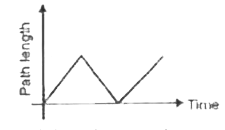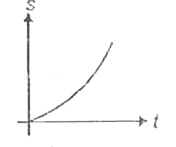Complete Solutions to ASSIGNMENT (SECTION - D) of chapter MOTION IN A STRAIGHT LINE of Class 12 book with complete answers and questions
| Class 12 | PHYSICS |
| Chapter | MOTION IN A STRAIGHT LINE |
| AAKASH INSTITUTE | ASSIGNMENT (SECTION - D) |
| Number Of Questions | 15 |
| Academic Year | 2023-24 |
A : It is not possible to have constant velocity and variable acceleration.
R : Accelerated body cannot have constant velocity.
View SolutionA : The direction of velocity of an object can be reversed with constant acceleration.
R : A ball projected upward reverse its direction under the effect of gravity.
View SolutionA : When the velocity of an object is zero at an instant, the acceleration need not be zero at that instant.
R : In motion under gravity, the velocity of body is zero at the top - most point.
View SolutionA : A body moving with decreasing speed may have increasing acceleration.
R : The speed of body decreases, when acceleration of body is opposite to velocity.
View SolutionA : for a moving particle distance can never be negative or zero.
R : Distance is a scalar quantity and never decreases with time for moving object.
View SolutionA : If speed of a particle is never zero than it may have zero averag speed.
R : The average speed of a moving object in a closed path is zero.
View SolutionA : The magntidue of average velocity in an interval can never be greater than average speed in that interval.
R : For a moving object distance traveled `ge"|Displacement|"`
View SolutionA : The area under acceleration - time graph is equal to velocity of object.
R : For an object moving with constant acceleration, position - time graph is a straight line.
View SolutionA : The motion of body projected under the effect of gravity without air resistance is uniformly accelerated motion.
R : If a body is projected upward or downwards, then the distance of acceleration is downward
View SolutionA : The relative acceleration of two objects moving under the effect of gravity, only is always zero, irrespective of direction of motion.
R : The acceleration of object moving under the effect of gravity have acceleration always in downward direction and is independent from size and mass of object.
View SolutionA : In the presence of air resistance, if the ball is thrown vertically upwards then time of ascent is less than the time of descent.
R : Force due to air friction always acts opposite to the motion of the body.
View SolutionA : The following graph can't exist actually

R :Total path length never decreases with time.
View SolutionA : The displacement (s) time graph shown in the figure represents an accelerated motion.

R : Slope of graph increases with time.
View SolutionA : Average velocity can be zero, but average speed of a moving body can not be zero in any finite time interval.
R : For a moving body displacement can be zero but distance can never be zero.
View SolutionA : For a particle moving in a straight line, its acceleration must be either parallel or antiparallel to velocity.
R : A body moving along a curved path may have constant acceleration.
View Solution
ASSIGNMENT (SECTION - D) questions and complete solutions for chapter MOTION IN A STRAIGHT LINE of AAKASH INSTITUTE ENGLISH of Class 12